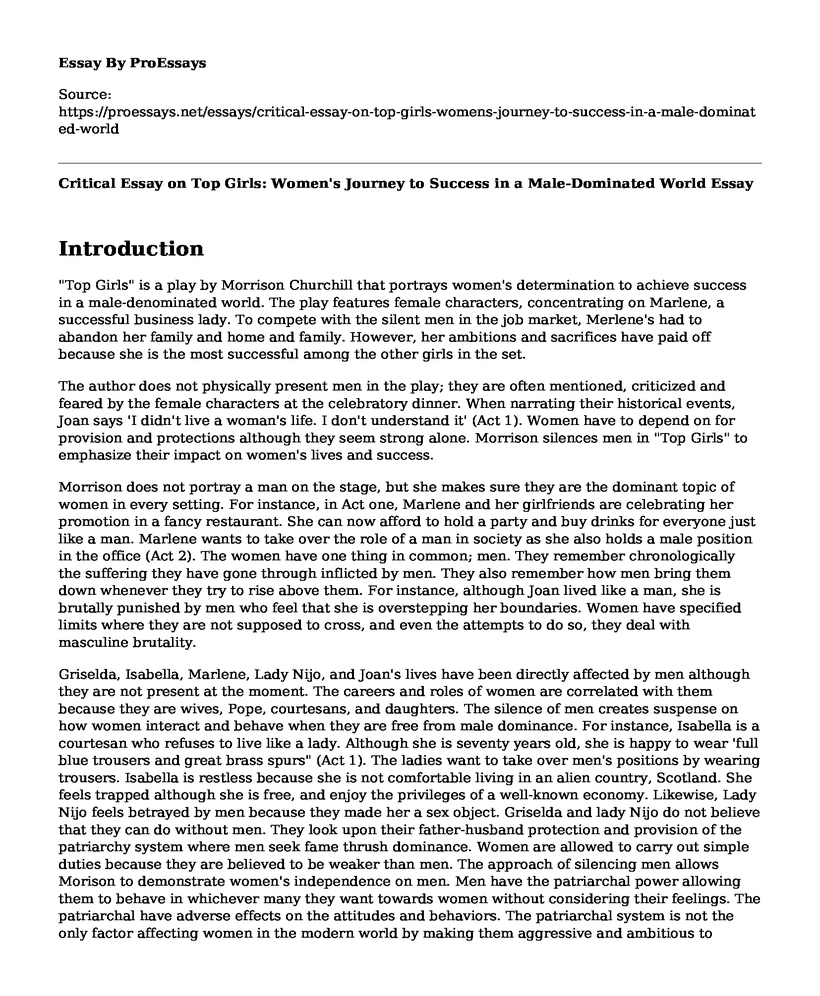Introduction
"Top Girls" is a play by Morrison Churchill that portrays women's determination to achieve success in a male-denominated world. The play features female characters, concentrating on Marlene, a successful business lady. To compete with the silent men in the job market, Merlene's had to abandon her family and home and family. However, her ambitions and sacrifices have paid off because she is the most successful among the other girls in the set.
The author does not physically present men in the play; they are often mentioned, criticized and feared by the female characters at the celebratory dinner. When narrating their historical events, Joan says 'I didn't live a woman's life. I don't understand it' (Act 1). Women have to depend on for provision and protections although they seem strong alone. Morrison silences men in "Top Girls" to emphasize their impact on women's lives and success.
Morrison does not portray a man on the stage, but she makes sure they are the dominant topic of women in every setting. For instance, in Act one, Marlene and her girlfriends are celebrating her promotion in a fancy restaurant. She can now afford to hold a party and buy drinks for everyone just like a man. Marlene wants to take over the role of a man in society as she also holds a male position in the office (Act 2). The women have one thing in common; men. They remember chronologically the suffering they have gone through inflicted by men. They also remember how men bring them down whenever they try to rise above them. For instance, although Joan lived like a man, she is brutally punished by men who feel that she is overstepping her boundaries. Women have specified limits where they are not supposed to cross, and even the attempts to do so, they deal with masculine brutality.
Griselda, Isabella, Marlene, Lady Nijo, and Joan's lives have been directly affected by men although they are not present at the moment. The careers and roles of women are correlated with them because they are wives, Pope, courtesans, and daughters. The silence of men creates suspense on how women interact and behave when they are free from male dominance. For instance, Isabella is a courtesan who refuses to live like a lady. Although she is seventy years old, she is happy to wear 'full blue trousers and great brass spurs" (Act 1). The ladies want to take over men's positions by wearing trousers. Isabella is restless because she is not comfortable living in an alien country, Scotland. She feels trapped although she is free, and enjoy the privileges of a well-known economy. Likewise, Lady Nijo feels betrayed by men because they made her a sex object. Griselda and lady Nijo do not believe that they can do without men. They look upon their father-husband protection and provision of the patriarchy system where men seek fame thrush dominance. Women are allowed to carry out simple duties because they are believed to be weaker than men. The approach of silencing men allows Morison to demonstrate women's independence on men. Men have the patriarchal power allowing them to behave in whichever many they want towards women without considering their feelings. The patriarchal have adverse effects on the attitudes and behaviors. The patriarchal system is not the only factor affecting women in the modern world by making them aggressive and ambitious to succeed despite the competition.
The author silences men to show the interrelationship between men and women in society. Marlene is the most successful, but she gave up her family and home to earn respect. Marlene has become cold, selfish and monstrous as this can be demonstrated in the way she looks at Agie, her niece. Marlene has lost all her moral values because instead of appreciating her niece, she seizes her and thinks that "She will never make it" because she is "a bit thick" (Act 3). Moreover, Marlene has no time for her mother and child after she got pregnant at seventeen. She criticized Joyce due to lack of class saying that she needs to be more aggressive and "pushy". Marlene says "I hate the working class" (Act 3) because they are stupid and lazy. However, this characterization is a stereotype because Joyce works harder than Marlene. She has never taken time with her child and a woman in the workplace complains that she left her baby for success. Another character who will lose something is Janine because she wants to make money, have a husband and travel. "I want more money....I'd like to travel' (Act 2) Janine fear that her husband will not allow her to travel or make money because she will be overstepping her boundaries. The men are silent because they deprive women of happiness if they want to achieve high status.
Conclusion
In conclusion, Maroon's play "Top Girls" was a successful work that depicted the experiences of women who try to rise in power. Women have been competing with men for equal opportunities in the workplace and have proven to be as productive as men. However, the patriarchal system limits women's capability to excel as men. Women have to forego significant factors such as family and friends to concentrate on financial excellence.
Cite this page
Critical Essay on Top Girls: Women's Journey to Success in a Male-Dominated World. (2023, Mar 20). Retrieved from https://proessays.net/essays/critical-essay-on-top-girls-womens-journey-to-success-in-a-male-dominated-world
If you are the original author of this essay and no longer wish to have it published on the ProEssays website, please click below to request its removal:
- Poverty and Substance Abuse - Sociology Essay Sample
- Childhood Obesity: Causes and Consequences
- Should Countries That Fail to Protect Women's Rights Suffer International Sanctions?
- Aspects of Colonialism and Racism in Selected Texts by Joseph Concard Essay
- Essay Sample on Childhood Obesity in United States
- Cybercrime vs. Cyberterrorism: Understanding the Difference - Essay Sample
- Essay on Booker T. Washington: Advocating for African Americans After Emancipation







